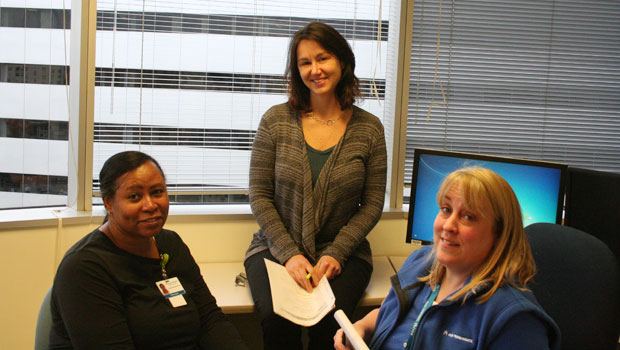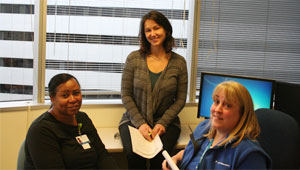Survey interviewers: Linking community and scientists for better health

Tiffany Gaines, Megan Baldwin, and Ellen Schartz
KPWHRI’s Survey Research Program reached out to nearly 55,000 Kaiser Permanente Washington members in 2017. Learn more about this small, skillful team.
If they passed each other on the street, Mitch (not his real name) and Kaiser Permanente Washington Health Research Institute (KPWHRI) Survey Research Program’s Tiffany Gaines would never know one another. But a telephone call she made might just have saved his life.
“There’s a man I remember,” says Tiffany. “It was our job to call with colorectal cancer screening reminders over a period of time. One of the folks told us that he’d been mad at us for ‘bugging’ him so much! Because of our reminders, though, he did get a colonoscopy, and that test showed that he had cancerous polyps. He told us he had gotten the care he needed and was now healthy. And he thanked us for bugging him.”
Tiffany’s outreach to Mitch was among thousands of contacts that KPWHRI’s Survey Research Program (SRP) makes each year to support the Institute’s mission of improving health and health care through research. In 2017, the SRP team engaged nearly 55,000 members via web, phone, and U.S. mail. It’s rare for research interviewers to learn that their work saved an individual’s life, but their efforts quietly and effectively drive a broad range of scientific studies.
KPWHRI’s SRP includes about 12 full-time staff with expertise in survey-research methods, plus 12 to 40 specially trained telephone interviewers. At any given time, the team is preparing or actively collecting data for 15 to 25 active research projects.
“SRP research interviewers take their role as representatives of Kaiser Permanente to our participants very seriously,” says Megan Baldwin, SRP manager. Their work requires adherence to ethical guidelines and federal and state regulations to keep medical records and all participant information confidential, she explains. At the same time, interviewers must have excellent interpersonal skills to enhance members’ willingness to participate.
“They get extensive training in research interviewing skills and techniques so that the data collected are the highest quality and the experience of our members is warm and positive,” adds Megan. “This is especially important during long and highly personal interviews. At all times, their focus is on the importance of research in improving the health and health care for the communities we serve.”
The survey team works on a broad range of projects funded by external agencies, both public and philanthropic, covering topics such as cancer screening, mental health, drug treatment, and costs of care. In addition, it has worked with the Kaiser Permanente Washington health care system on membership experience surveys, with the national KP Research Bank on designing provider surveys, and with external groups such as Service Employees International Union (SEIU) to survey its membership.
Megan explains that much of her team’s recent work has been attempting to address the opioid epidemic. Interviewers have been connecting with many Washington residents who are experiencing chronic pain and addiction, compounded by concerns about losing access to medications and health care.
“I did three interviews the other day,” says Survey Project Manager Ellen Schartz, who is collecting data for the Understanding Pain Study (UPS), which aims to learn how chronic pain affects members in several large health plans throughout the U.S. The UPS survey asks participants about any pain they may be experiencing, problems or feelings related to the pain, and how they manage the pain.
“One of the folks I talked with had the most intense pain on a scale of 1 to 10. She said her husband is really good to her, and then she began to cry,” says Ellen. “I offered to stop the interview because I didn’t want to make anything worse for her, but she said it was OK to keep going. It was so emotional for her. When you’re in pain all the time, and someone’s showing you kindness, it can make you feel emotional.”
Because SRP staff talk with so many KP members about various aspects of their health and health care, they also need to know how to respond to questions about care and service. Survey staff are trained to point participants to the right resources.
“And if we hear from members that they have concerns about the care they receive in KP settings, we listen and take it seriously. We document issues, forward them to KPWHRI researchers, and direct members to KP’s Member Services Department,” Ellen explains.
Helping others is important to Kaiser Permanente members
While some study participants—like Mitch—have gotten a direct personal benefit from their involvement in KPWHRI research, with many projects, that’s not the case. Rather, study participation is a voluntary act that benefits others later on when research findings are used to improve health and health care.
Our interviewers help participants understand this equation, and for the most part, people are eager to help, says Ellen. Study participants often say that if they can help someone else to feel better, they’ll do it.
“When people hear that we’re studying something that reflects their personal experience and directly impacts their lives, they feel their perspective is valued and important,” adds former interviewer Janna Webbon, who now works at KPWHRI’s MacColl Center. “They’re happy to talk with us if it can help others who might have the same issues.”
Still, there are times when a research study has a direct and individually positive influence, and it’s thrilling to be part of that, says Tiffany. One of her favorite projects was the oncology nurse navigator trial led by KPWHRI Senior Research Associate Evette Ludman, PhD and MacColl Center Emeritus Director Ed Wagner, MD, MPH.
“Patients raved about the nurses. They told us it was overwhelmingly meaningful to have that type of support,” Tiffany remembers. And now, many Kaiser Permanente members with a cancer diagnosis have access to nurse navigator services. Tiffany sees how the information she helped collect had a real impact on patients.
The research-based clinical care improvements we seek to discover and implement would not be possible without the Kaiser Permanente members who participate in our studies--nor without the SRP staff like Tiffany, Ellen, and Janna who engage them in our work.
You could say we’re all in this work together.
by Dona Cutsogeorge
Survey Research Program

Our survey team brings expertise and efficiency to a variety of studies—providing custom survey design, study recruitment, data collection, and more.
KPWHRI News

March 2018
- Survey interviewers: Linking community & scientists for better health
- Gun safety is crucial for families with high-risk teens
- Opioids may raise risks for serious infections
- What to expect after a screening breast MRI vs. mammography alone
- As health researchers, our time is now
- Flucasting week 17: Predicting influenza severity


